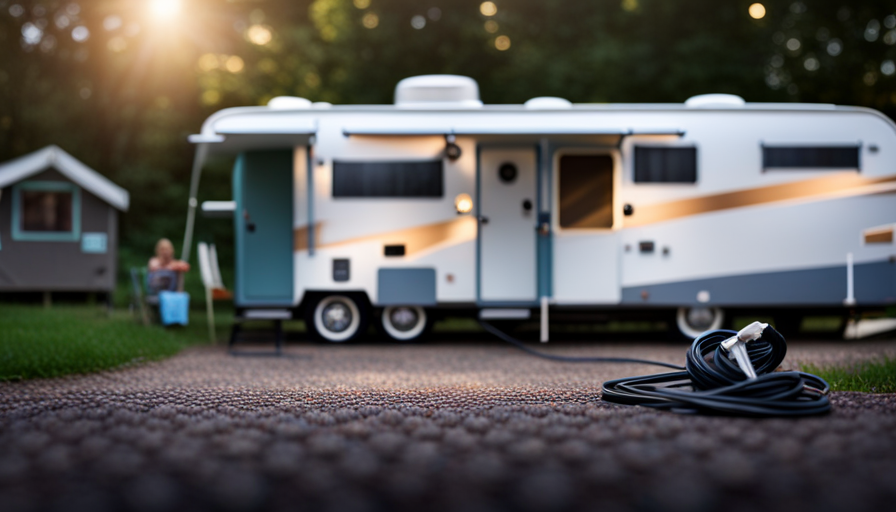When the camper converter malfunctions, what are the consequences?
It’s a question that every camper owner should be prepared to answer. As avid campers ourselves, we understand the importance of a reliable camper converter and the impact it can have on our overall camping experience.
In this article, we will explore the inner workings of a camper converter, its role in powering your electrical system, and the signs that indicate it may be failing.
From loss of power and electrical malfunctions to battery drainage and charging issues, we will delve into the potential consequences of a bad camper converter.
But fear not, fellow campers! We will also provide you with troubleshooting tips and DIY fixes to help you get back on track. And if all else fails, we’ll guide you on when it’s time to seek professional help.
So, let’s dive in and ensure that your camping trips are always powered up and worry-free!
Key Takeaways
- Failing camper converter can lead to loss of power and electrical malfunctions, including flickering lights and loss of power to certain appliances.
- A bad converter can cause power surges and electrical damage to the camper’s wiring system, potentially leading to fire hazards.
- Inadequate charging of the battery can result in reduced power supply to appliances and electronics, as well as excessive battery drainage and shortened battery lifespan.
- Troubleshooting and DIY fixes should only be attempted if familiar with electrical systems and have the necessary tools, as improper repairs can cause more damage or risk. Seeking professional help is recommended.
What is a Camper Converter and How Does it Work?
So you’re probably wondering, what exactly is a camper converter and how does it work? Well, let us explain.
A camper converter is an essential component of your RV’s electrical system that converts the 120-volt AC power from your campground hookup into 12-volt DC power. This 12-volt DC power is used to charge your RV’s batteries and power the DC appliances and lights inside your camper. The camper converter is typically installed near the power distribution panel in your RV.
During camper converter installation, the AC power is first fed into the converter, which then uses a series of circuits and components to convert it into DC power. This DC power is then distributed to various parts of your RV, ensuring that your batteries are charged and your DC appliances are functioning properly.
However, like any other electrical component, camper converters can experience problems. Some common camper converter problems include overheating, failure to charge batteries, and electrical shorts. These issues can be caused by various factors such as worn-out components, faulty wiring, or excessive power usage.
In the next section, we’ll discuss the signs of a failing camper converter so that you can identify them early on and take necessary steps to address the issue.
Signs of a Failing Camper Converter
When your camper’s converter starts to fail, you may notice various warning signs that indicate a potential malfunction. Camper converter troubleshooting is crucial to ensure the proper functioning of your camper’s electrical system.
One common problem is the converter not charging the battery properly. This can result in a loss of power and the inability to operate electrical appliances efficiently.
Another sign of a failing converter is flickering lights or dimming of the interior lighting. This could be caused by a faulty converter unable to provide a steady flow of power to the lights.
Additionally, overheating is another common issue with camper converters. If you notice that the converter is excessively hot to the touch, it may be a sign of a malfunction.
Finally, if you experience a sudden loss of power to certain appliances or outlets in your camper, it could be due to a faulty converter. Troubleshooting these common camper converter problems is essential to avoid further electrical malfunctions.
Moving forward, let’s explore the section about loss of power and electrical malfunctions.
Loss of Power and Electrical Malfunctions
Experiencing a sudden blackout in your camper’s electrical system is like being left in the dark on a moonless night. It’s a frustrating and potentially dangerous situation.
One possible cause of this issue is a failing camper converter. When the converter goes bad, power surges and overheating can occur, leading to a loss of power and electrical malfunctions.
A power surge happens when there’s a sudden increase in electrical voltage. This can overload the converter and cause it to fail. Overheating is another common problem that can occur with a failing converter. As the converter works to convert the AC power from the campground into DC power for your camper, it can generate excess heat. Over time, this heat can cause damage to the converter, leading to a loss of power.
When the camper converter goes bad, it can have a significant impact on appliances and electronics. Without a properly functioning converter, these devices may not receive the power they need to operate correctly. This can result in appliances not turning on, lights flickering, and electronics malfunctioning.
It’s essential to address a failing camper converter promptly to avoid further damage and ensure the safe operation of your camper’s electrical system.
Impact on Appliances and Electronics
Imagine being left in complete darkness on a moonless night, your appliances powerless, lights flickering, and electronics malfunctioning – all because of a failing camper converter. This unfortunate situation highlights the significant impact a faulty converter can have on your appliances and electronics. Here are three key aspects to consider:
-
Appliance compatibility: A camper converter ensures the smooth functioning of appliances by converting the incoming electricity to a suitable voltage level. However, when the converter goes bad, it can lead to voltage fluctuations. These fluctuations can wreak havoc on sensitive appliances, causing them to malfunction or even become permanently damaged. It is crucial to ensure that your appliances are compatible with the voltage output of the converter to avoid such issues.
-
Voltage fluctuations: A failing camper converter can result in unstable voltage levels, leading to irregular power supply. This can cause appliances to operate at incorrect voltages, affecting their performance and longevity. Appliances may experience reduced efficiency, overheating, or even complete failure. Proper maintenance and regular checks can help identify converter issues before they escalate and impact your valuable appliances.
-
Electronics malfunctioning: In addition to appliances, sensitive electronics like laptops, smartphones, and entertainment systems are at risk when the camper converter goes bad. Voltage fluctuations can cause these devices to behave erratically, freeze, or even get permanently damaged. It’s essential to use surge protectors or voltage regulators to safeguard your electronics from potential harm.
As we delve into the next section on battery drainage and charging issues, it’s important to understand how a failing camper converter can impact these aspects as well.
Battery Drainage and Charging Issues
The impact of a faulty camper converter on battery drainage and charging issues can be visually represented as a dimming flashlight in a dark cave. When the camper converter goes bad, it can lead to significant problems with the battery lifespan and power management.
A malfunctioning converter can cause excessive battery drainage, resulting in a shortened battery lifespan. This means that the battery won’t hold a charge for as long as it should, affecting the overall performance of the camper’s electrical system.
Additionally, a faulty converter may not properly regulate the charging process, leading to inadequate charging of the battery. This can result in a decreased battery capacity and reduced power supply to the appliances and electronics in the camper.
Battery drainage and charging issues can have a domino effect on the overall power management of the camper. When the battery isn’t functioning optimally, it puts a strain on the entire electrical system. This can lead to issues with other components, such as the inverter or fuse box.
Moreover, inadequate battery charging can compromise the functionality of appliances and electronics.
A faulty camper converter can have a significant impact on battery drainage and charging issues, affecting the battery lifespan and power management. This can lead to potential safety hazards, which we’ll discuss in the subsequent section.
Potential Safety Hazards
To ensure your safety, it’s important to be aware of the potential hazards that can arise due to a faulty converter in your camper. A malfunctioning converter can lead to serious issues, including potential fire and electrical damage. Here are some key hazards to watch out for:
-
Overheating: A bad converter can cause excessive heat buildup, which can result in a potential fire hazard. It’s crucial to regularly check the temperature of the converter and address any signs of overheating promptly.
-
Electrical Shorts: A faulty converter can cause electrical shorts, leading to power surges or even electrical damage to your camper’s wiring system. This can put your safety at risk and may require extensive repairs.
-
Battery Overcharging: A malfunctioning converter may fail to regulate the charging of your camper’s battery properly. This can result in overcharging, which can damage the battery and pose a safety hazard.
-
Inadequate Grounding: A bad converter can lead to inadequate grounding, increasing the risk of electrical shock or electrocution.
It’s vital to address any potential safety hazards associated with a faulty converter promptly. In the next section, we’ll discuss troubleshooting and DIY fixes to help you resolve these issues without the need for professional assistance.
Troubleshooting and DIY Fixes
Now that we’ve discussed the potential safety hazards associated with a bad camper converter, let’s move on to troubleshooting and DIY fixes.
Diagnosing problems with a camper converter can be a bit challenging, but with some basic knowledge, you can identify common converter issues.
One common issue is a converter that fails to charge the battery properly. This can be caused by a faulty connection or a blown fuse. To diagnose this problem, you can start by checking the connections and ensuring they’re tight and secure. If the connections are fine, then you can move on to checking the fuses and replacing any blown ones.
Another common problem is a converter that produces excessive heat. This can be a sign of a failing converter or inadequate ventilation. To troubleshoot this issue, you can inspect the converter for any visible damage or signs of overheating. Additionally, make sure there’s proper airflow around the converter to prevent overheating.
When it comes to troubleshooting and DIY fixes for a bad camper converter, it’s important to have a good understanding of the electrical system and take necessary precautions. However, in some cases, it may be best to seek professional help.
In the next section, we’ll discuss when it’s appropriate to consult a professional for assistance.
When to Seek Professional Help
If you’re in a pinch, it might be wise to call in the experts to fix your problematic camper converter. Seeking professional assistance can save you time and effort, especially if you’re not familiar with electrical systems or lack the necessary tools. A qualified technician will have the expertise to diagnose the issue accurately and provide the most effective solution. They can also ensure that all safety protocols are followed during the repair process.
While there are DIY repair options available, it’s essential to recognize when the problem exceeds your capabilities. If you attempt to fix a faulty converter without the necessary knowledge and experience, you could potentially cause more damage or put yourself at risk. It’s better to be safe than sorry, especially when dealing with electrical components.
In addition to resolving the immediate issue, a professional can also offer valuable advice on preventive maintenance tips. This’ll help you avoid future problems and extend the lifespan of your camper converter. Regular inspections, cleaning, and proper usage can go a long way in keeping your converter in good working condition.
By seeking professional help and following preventive maintenance tips, you can ensure that your camper converter stays in optimal shape and continue enjoying your outdoor adventures without any electrical interruptions.
Preventive Maintenance Tips
Make sure you’re taking proper care of your camper converter – are you aware of the preventive maintenance tips that can help extend its lifespan and keep it running smoothly? Preventive maintenance is crucial in ensuring the optimal performance of your camper converter. Here are some essential tips to consider:
- Regularly inspect the converter for any signs of damage or wear, such as loose wires or burnt components.
- Keep the converter clean and free from dust and debris by using compressed air or a soft brush to remove any buildup.
- Check the battery connections to ensure they’re secure and free from corrosion.
By following these preventive maintenance tips, you can minimize the risk of your camper converter going bad and experiencing any unwanted issues. However, if you do encounter problems with your converter, it’s important to know some troubleshooting techniques. These may include checking the input and output voltages, testing the fuses, and examining the wiring connections. If you’re unsure or unable to resolve the issue, don’t hesitate to seek professional help.
Regular inspections and upgrades are also crucial to ensure the longevity and efficiency of your camper converter. By staying proactive and addressing any potential issues promptly, you can avoid costly repairs and enjoy worry-free camping adventures.
Importance of Regular Inspections and Upgrades
Regular inspections and upgrades are essential for ensuring the longevity and efficiency of your camper’s power system. They are like keeping your vehicle in top shape to handle any adventure that comes your way. The importance of regular maintenance cannot be overstated, as it helps to identify any potential risks and dangers that may arise from a bad camper converter.
When a camper converter goes bad, it can lead to various issues that can affect the overall functionality of your power system. These issues may include power fluctuations, electrical shorts, or even complete power failure. Regular inspections allow you to identify any signs of wear and tear, such as damaged wiring or burnt-out components, which can be addressed before they escalate into more significant problems.
Upgrades are equally important as they enable you to keep up with the latest technological advancements in camper converters. Newer models often offer improved efficiency, better power management, and enhanced safety features, reducing the risk of potential dangers. By staying updated with these upgrades, you can ensure that your camper’s power system is operating at its optimal level, providing you with a reliable and safe power source during your camping adventures.
Regular inspections and upgrades are crucial for maintaining the longevity and efficiency of your camper’s power system. By prioritizing regular maintenance, you can minimize the potential risks and dangers associated with a bad camper converter, ensuring a worry-free camping experience.
Frequently Asked Questions
Can a bad camper converter cause damage to other electrical components in the camper?
Yes, a bad camper converter can potentially cause damage to other electrical components in the camper. It’s important to address this issue promptly to prevent further harm. Common causes of camper converter failure include overloading, power surges, and age-related wear and tear. To troubleshoot a bad camper converter, you can start by checking the fuses, testing the voltage output, and inspecting for any visible signs of damage. It’s always advisable to consult a professional for proper diagnosis and repair.
How long does a camper converter typically last before it needs to be replaced?
The average lifespan of a camper converter is typically around 5-10 years. However, this can vary depending on usage and maintenance. Signs of a failing camper converter may include a decrease in power output, flickering lights, or a burnt smell.
It’s important to regularly check and replace the converter when necessary to prevent damage to other electrical components in the camper.
Can a camper converter be repaired, or does it always need to be replaced?
Yes, a camper converter can sometimes be repaired, but it may also need to be replaced depending on the extent of the damage. Common causes of camper converter failure include power surges, overloading, and faulty wiring.
Repairing a camper converter usually involves diagnosing the specific issue and replacing damaged components. However, in some cases, the damage may be too severe, and a replacement may be necessary.
Can a camper converter be upgraded to improve its performance?
Upgrading a camper converter can significantly improve its performance. The benefits of upgrading include enhanced power efficiency, increased charging capacity, and improved reliability.
With a more advanced converter, you can expect a faster and more efficient charging process, allowing you to power your camper’s appliances and devices more effectively. Additionally, an upgraded converter can handle higher loads, ensuring a stable power supply and preventing potential issues caused by insufficient power.
Are there any warning signs that a camper converter is about to fail, so that it can be replaced before any damage occurs?
Oh, the joys of a failing camper converter. It’s like a surprise waiting to happen! But fear not, fellow adventurers, for there are warning signs that can save the day.
Keep an eye out for flickering lights, a sudden decrease in battery power, or strange humming noises. If you suspect trouble, follow these steps to troubleshoot: check the fuse, inspect the wiring, and test the converter’s output voltage.
Stay vigilant, my friends, and keep those converters in check!
Conclusion
In conclusion, when the camper converter goes bad, it can cause a myriad of problems that can negatively impact your camping experience. One of the most common issues that arise from a faulty camper converter is a drained battery, leaving you without power for essential items such as lights and appliances. Additionally, it can also result in issues with charging other devices, such as smartphones or laptops, making it difficult to stay connected while on the road. It is important to understand what ohc means on camper so that you can identify and address any potential problems with the converter before they escalate.
From loss of power and electrical malfunctions to battery drainage and charging issues, a failing converter can be a real headache.
It’s important to stay vigilant and watch out for signs of trouble. While some issues can be fixed with simple troubleshooting and DIY fixes, others may require professional help.
Regular inspections and upgrades are crucial to prevent converter failures. Don’t let a faulty converter dampen your camping adventures!










